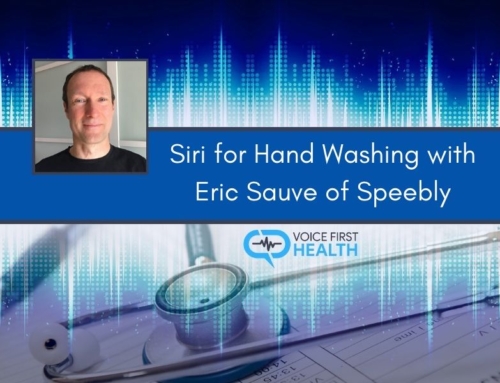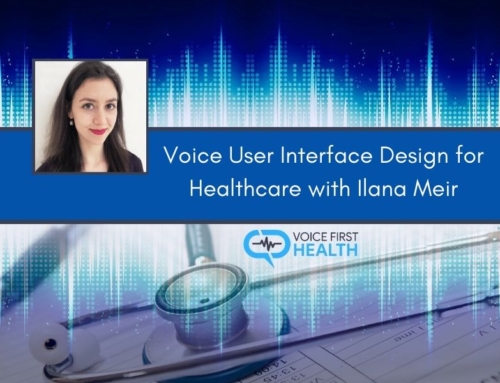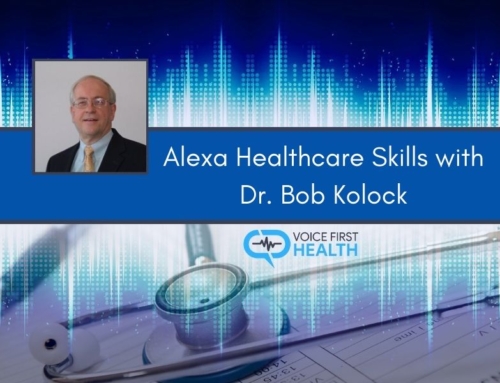VFH Episode 25
In this episode, Teri shares his interview on the Boldly Podcast by Joule Inc.
The podcast is hosted by Steve Mortimer, Joule’s Vice President of Business Development. Steve interviews thought leaders who are making strides in Canadian health care and beyond.
They share their ideas that are shaping the world and Boldly spreads them. Teri had the opportunity to join the host to talk about voice technology, how it’s disrupting health care, and how transformational the technology is expected to be in the future.
Enjoy!
Voice Technology and How it’s Impacting Society
- Computers are adapting to the way we communicate as human beings.
- We are entering an era of ambient computing where there will be microphones around us and we are going to be interacting with a computer through our voice, but won’t be voice only. Sometimes a screen (something visual) will be required to provide something visual.
- Voice is powerful because it’s the most natural and much more efficient than typing or texting.
- Speaking is actually 3 to 4 times more efficient than typing or texting. The average person can type at least 40 words per minute while the average person will speak about 150 words per minute.
- With voice, a person can multitask and do just about anything while talking.
Using Voice Technology to Solve Health Care Challenges in Canada
- To have an efficient health care system, there must the right care, at the right time and in the right place. Voice can ensure all three.
- The right care: When somebody has a health care concern, they don’t know the best place to access the system and what the right care is for them. Voice assistants can fill this gap perfectly. When someone wakes up feeling unwell, they can talk to their AI voice assistant, tell her how they feel, and the voice assistant will use good evidence-based medicine and proven algorithms to provide care.
- The right time: The voice assistant will go through a symptom checklist to determine what is wrong with someone. The assistant will act as a virtual triage nurse in a home. This could direct the resources of the health care system as a whole at an individual level. The voice assistant can decide how urgently a person needs to be seen by a doctor and also direct the person to the right health care location.

How Voice can Help Patients Navigate the Health Care System
- Voice first computing will bring about patient-first health care where the patient is the leader. Voice assistants can diagnose diseases through the use of vocal biomarkers (the way the patient sounds) and it can give guidance on what to do. The patient will interact with the voice assistant and the assistant will help them figure out where to tap into the health care system.
- That will take some pressure off of the health care workers and overcrowded health care facilities.
- As voice assistants develop, they will become more and more effective at guiding patients.
Present Situation
- With voice technology, we are at an early stage similar to how it was 11 years ago with the smartphone.
- Right now, health care oriented voice applications are relatively simple and provide information to patients, for example, The Mayo Clinic has a First Aid skill which is a complete voice-enabled interaction where somebody who needs First Aid calls upon it through voice.
- There are skills that provide health care information and other types of skills.
- There is ongoing research and development of more complex skills that will have more back and forth interaction between a patient and the voice assistant (caregiver). 2018 has been referred to as the year of the pilot studies for such skills and 2019 is expected to be the year when they come to market. The biggest barrier is the issue of privacy. There aren’t regulations yet to allow voice assistants to store medical information but it’s being worked on.
- Privacy is the biggest barrier to integrating voice first into the health care systems. Once people realize the convenience that voice first will provide in health care, they will adopt the technology more.
The Future of Voice First in the Next 10 Years
- As the AI in voice assistants becomes more intelligent, it will be able to further understand what a patient is experiencing and then become a guide to the health care system.
- There is going to be decentralization of health care where we will have little mini-clinics in each person’s home where voice assistants will be present. It’s going to be a way for a person to interact with the health care system in their home. It will mean fewer patients will put their demands on the health care facilities because they will get the necessary advice in their home.
- An exciting area over the next 5 to 10 years is the whole idea of vocal biomarkers, which comprises of pulling out metadata from voice, similar to the way metadata is taken from a photo in digital photography. The AI in the algorithms can pick up the emotion in a voice. Devices can pick up somebody’s emotional state based on the way they are talking to it. The devices can scientifically quantify the emotion in a voice by looking at the audio waveforms. The devices can pick up changes in the way that someone is using words. They can use all that to determine if someone has different types of diseases like Dementia and Parkinsons.
- Research shows that we will be able to use voice as another vital sign. A device will listen to the way a person is speaking and be able to pull out diagnosis and even suggest risks for certain diseases.









